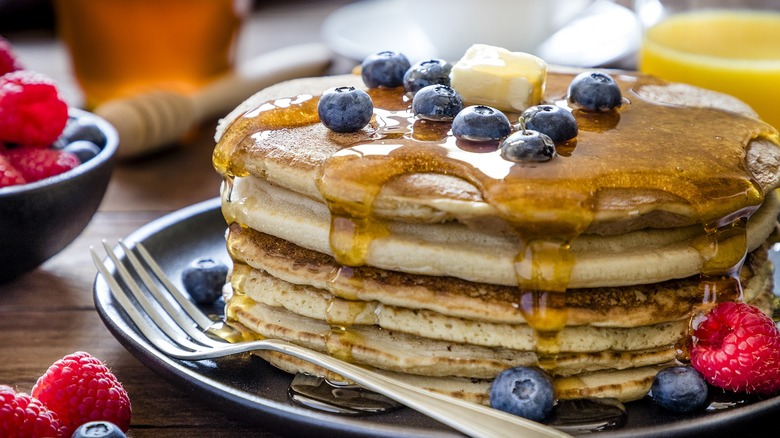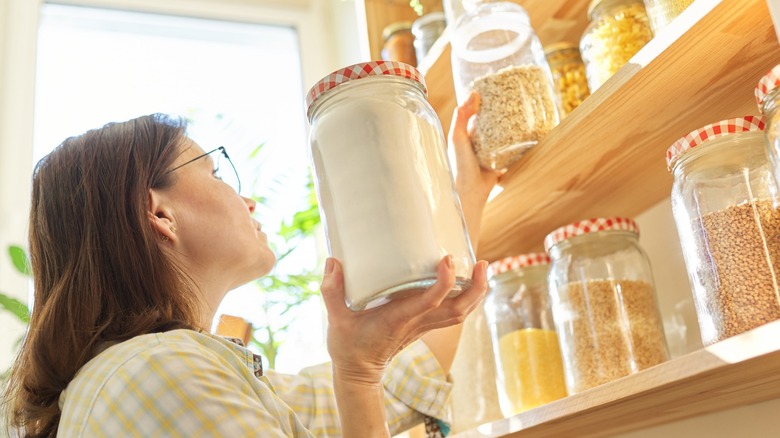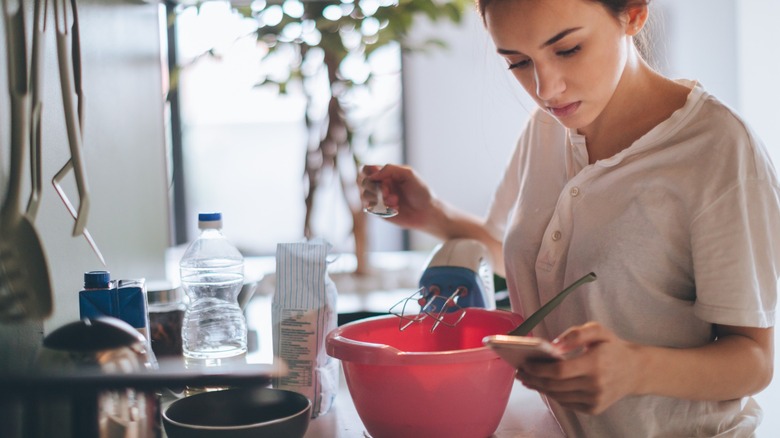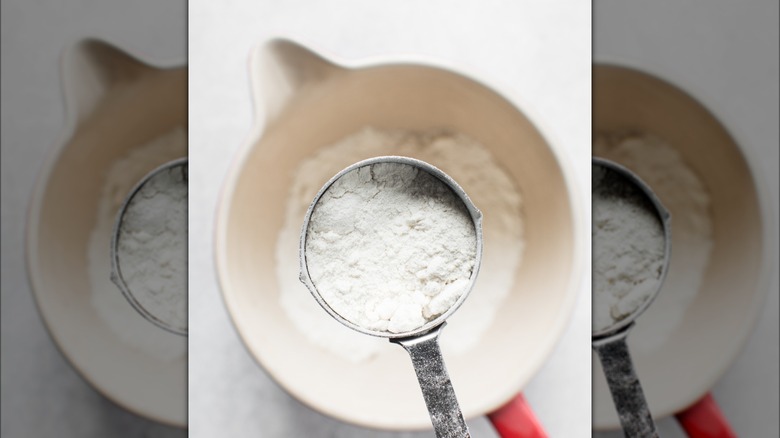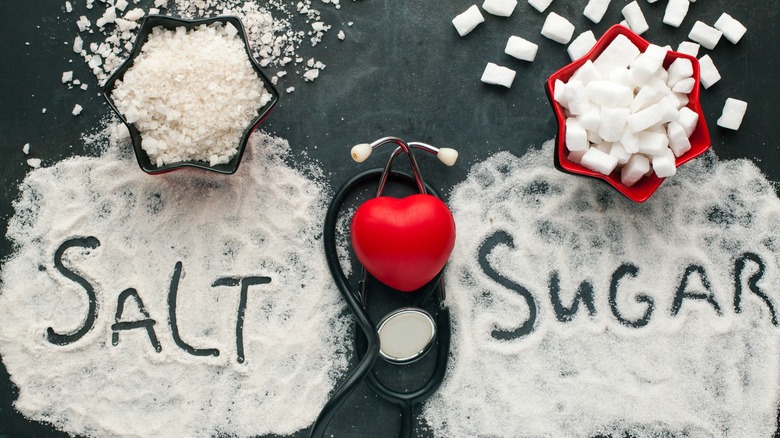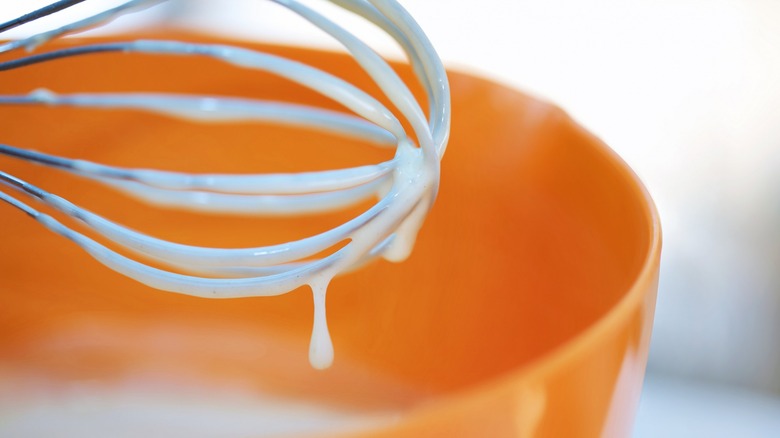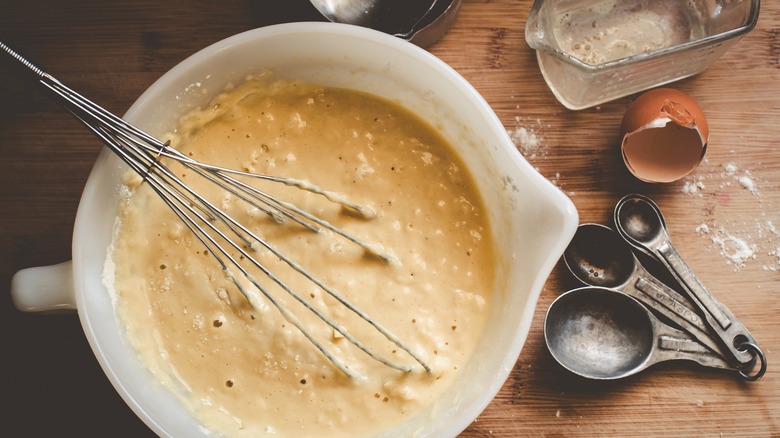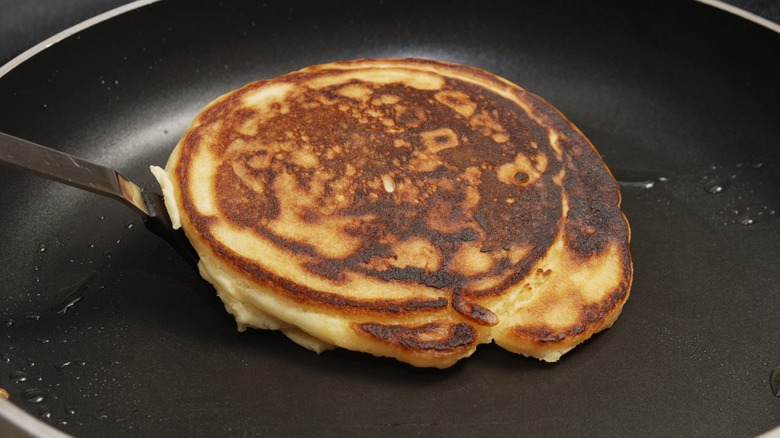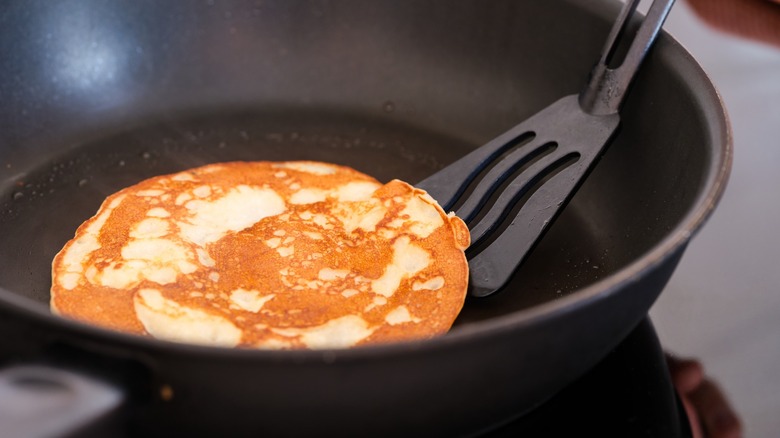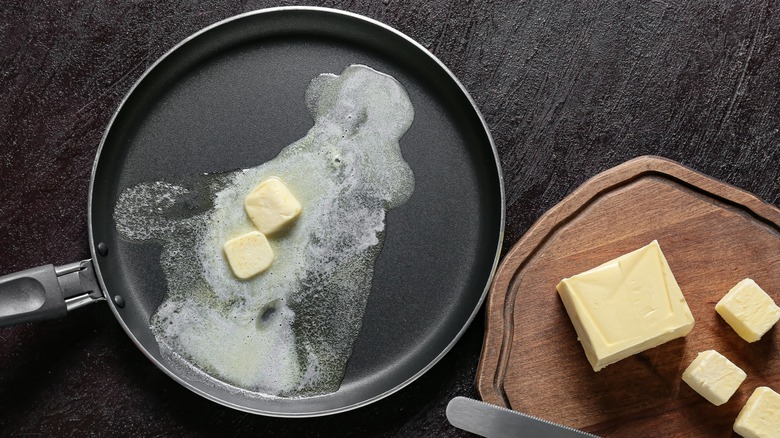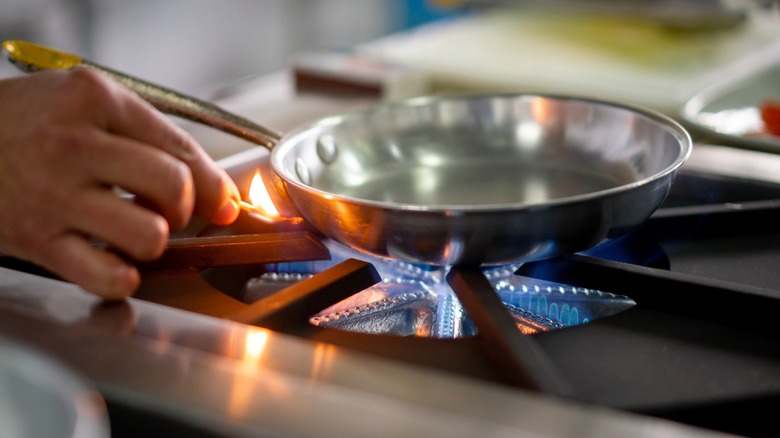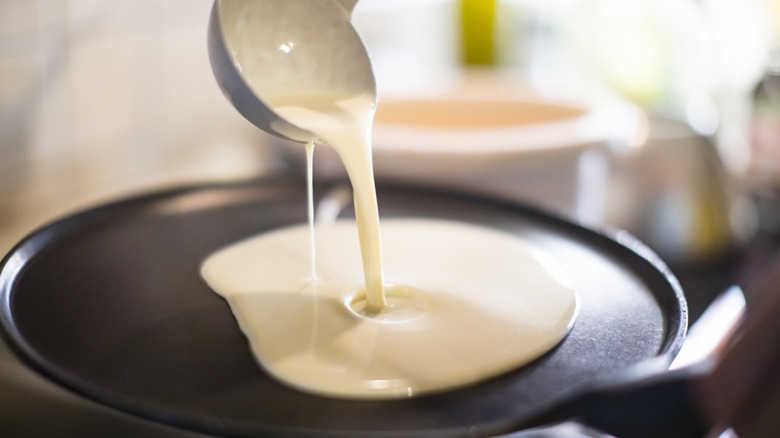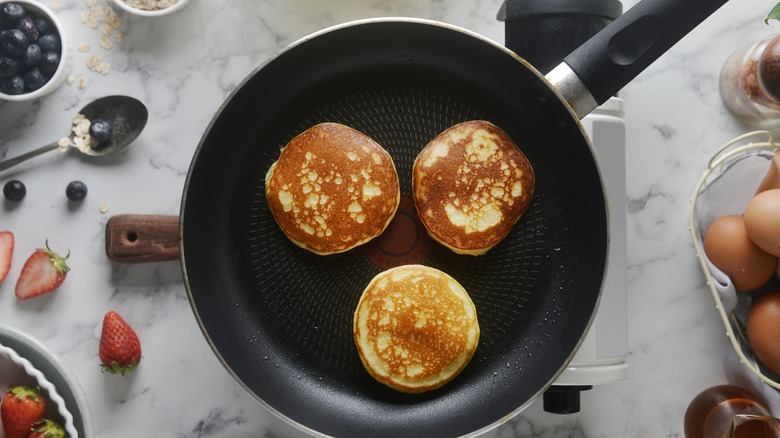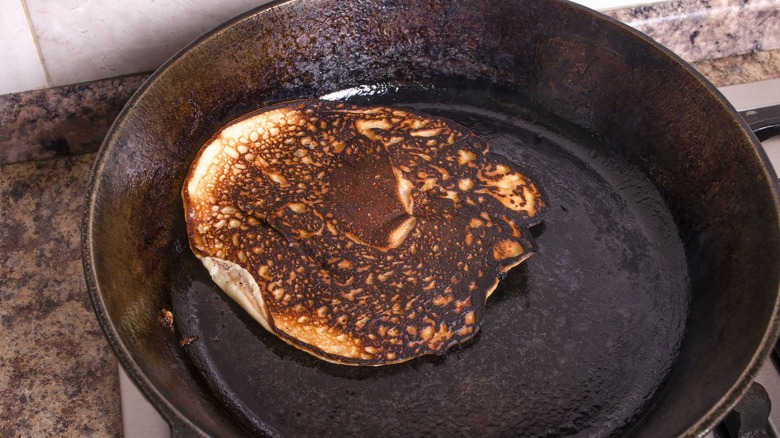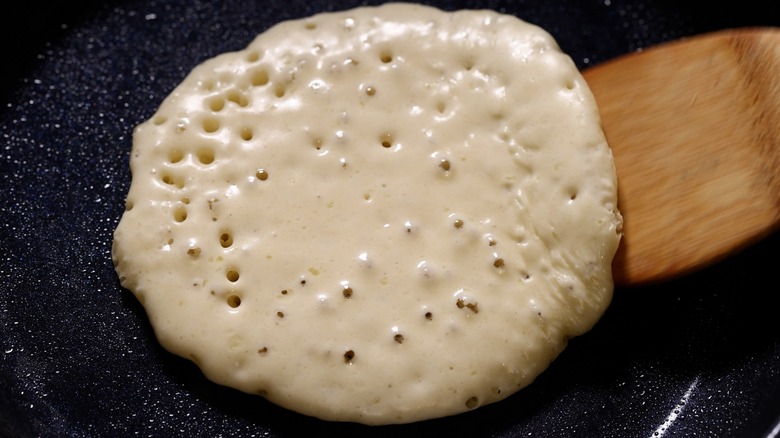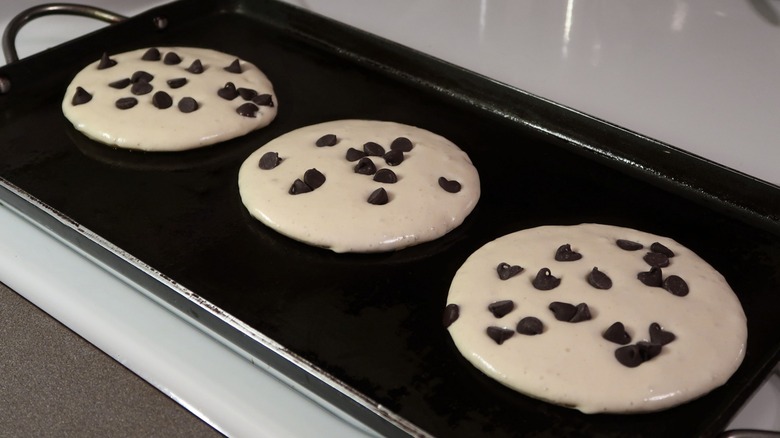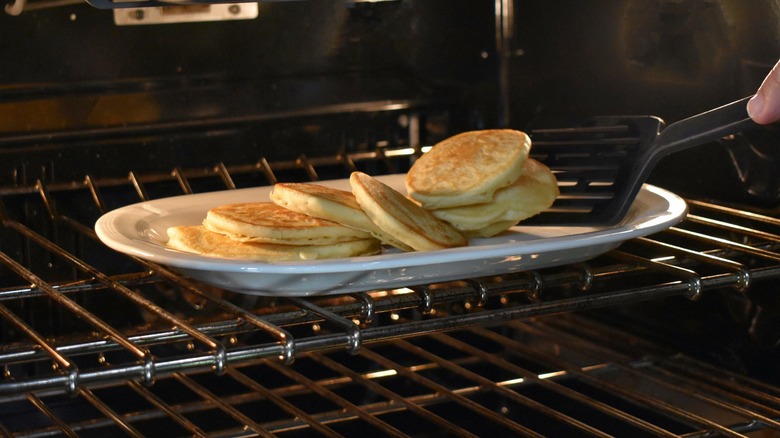16 Common Pancake Mistakes Everyone Makes
If you've decided to make pancakes from scratch rather than relying on store-bought mix, congratulations! Pancakes are surprisingly easy to make at home and you'll have total control over what is — and isn't — in them, which means you can avoid any additives.
However, don't be fooled into thinking that making from-scratch pancakes is a walk in the park. There are some common mistakes that everyone makes when cooking pancakes. Once you're aware of these pitfalls, you can avoid them to ensure your pancakes are perfect crowd-pleasers every time.
We've rounded up 16 of the most common mistakes — we'll dive into what problems they cause and how to avoid them. We'll also provide some advice on what you should do instead to ensure your pancakes come out fluffy, light, and delicious. What are you waiting for? Your friends and family are going to be queuing up for a short stack — or a full stack — of the best pancakes they've ever tasted!
1. Using old ingredients
Basic pancake recipes are pretty simple. That said, because they only contain a few ingredients, it's important to ensure the quality of each one. We recommend using freshly purchased ingredients whenever possible, rather than those that have been stored at the back of your pantry for months. This will ensure you always get the best results.
For example, baking powder, the leavening agent responsible for making pancakes light and fluffy, is at its best when less than six months old. You can still use older baking powder, but it might not work and you could end up with dense, stodgy pancakes.
2. Not sticking to a recipe
There are times to wing it in the kitchen, and times to rely on a trusted recipe. Making pancakes is a time for the latter. Find a reliable recipe on a site you trust — or in a favorite cookbook — or ask a friend or family member for their top-secret pancake recipe, if they always dish up perfect results.
Winging it with pancakes isn't a good idea as it's important to use precise quantities of each ingredient to ensure your pancakes turn out perfectly. Make sure you stick to the recipe you choose, too — don't add an extra spoon of this or a cup of that. Pancake recipes are tested to ensure that the ratio of flour to eggs, butter, milk, and other ingredients is spot on, so while that batter might look too thick or too runny at the mixing stage, trust in the process!
You can go as basic or as complex as you like with pancake recipes. You'll find everything out there from the simplest pancake batter recipe to some really creative pancake recipes with sweet and savory ingredients.
3. Not measuring your ingredients carefully
As well as using a recipe that specifies the exact quantities of each ingredient, you'll need to ensure you have the right equipment to measure ingredients precisely. If a recipe calls for a tablespoon of baking powder and you add a couple of teaspoons, you may not get the results you're hoping for.
Using dry and liquid measuring cups and spoons ensures that you'll always be able to measure your ingredients precisely, so you should get predictably perfect results from your recipe. Don't forget to level off ingredients when measuring them out, too, unless a heaped cup or tablespoon is called for. Double and triple-check your recipe to ensure you're not using a tablespoon of something when it's a teaspoon that is called for — you'd be surprised by how easy it is to do this.
4. Forgetting to add salt or sugar
If you make your pancake batter without any salt or sugar, your pancakes will taste bland, end of. But it's not just their flavor that will be impacted. A pinch of salt helps bring out the natural sweetness in pancakes, but sugar has an even more important role to play.
Adding sugar to your pancake batter not only encourages the pancakes to brown as the sugar crystallizes, but it also helps form those delicious crispy edges that all the best pancakes are known for. So if you want your short stack to look as good as it tastes, don't forget to add sugar! Most recipes call for a tablespoon or two, but make sure you follow whichever recipe you choose.
5. Over-mixing the batter
We get it, you're enthusiastic about your pancake batter and you want it to be silky smooth, without a lump in sight. Though it can be tempting to whisk out every little lump in your batter, did you know that by doing so you're actually over-mixing it? This can affect the end results.
When you over-mix the batter, you're also over-developing the gluten in the flour. This might not sound that serious, but it can cause your pancakes to be tough and chewy rather than light and fluffy, and nobody wants chewy pancakes.
Instead of whisking your ingredients together vigorously, add your dry ingredients to the mixing bowl and make a well in the middle. Add the wet ingredients and mix them gently to incorporate them, rather than trying to blend out all the lumps.
6. Not letting the batter rest
This next mistake is one that most of us make. Though some say there's no need to let your pancake batter rest, we recommend that you let it sit for at least 10 minutes before you start cooking in order to achieve the best results.
Resting your batter allows the flour to properly hydrate by mixing thoroughly with the wet ingredients to prevent tough, chewy pancakes. It also ensures that the leavening agent, such as baking powder, is evenly distributed throughout the mix. That's what gives you those wonderfully light, fluffy results.
While it's not absolutely essential to rest your batter if you're in a rush at breakfast time, if you have the time to do it, it's definitely worth it. You'll notice your pancakes are airier and fluffier as a result.
7. Using the wrong type of pan
If you've ever tried to make pancakes in a pan with sloping sides, or worse, a wok, you know what we're talking about here. Using the right pan is the difference between perfect pancakes and a complete disaster. For the best results, you'll want a pan with a flat base and plenty of surface space — so don't use a sauté pan. A flat-based pan makes it much easier to flip your pancakes and gives each one plenty of contact with the base of the pan to ensure even cooking.
We'd opt for a well-seasoned cast iron skillet or griddle, a non-stick pan with plenty of flat surface space, or even an electric griddle. You also need to spend some time ensuring you have the right utensils and equipment before you get started cooking.
8. Using the wrong utensils and equipment
We just mentioned the importance of using the right pan for cooking your pancakes, and now we'll dive into why you need to stop using the wrong utensils and equipment. If you've ever used a spoon, knife, or fork to flip your pancakes, or a tiny bowl to mix your batter, you're not alone.
When mixing your pancake batter, you need a large bowl. Something that gives you space to gently fold the wet ingredients into the dry without flour and milk going everywhere is perfect. You'll also need a large, wide-angled spatula for flipping your pancakes once they're cooked on one side. A thin metal spatula that easily slides under each pancake is ideal, but if you're using a nonstick skillet or pan, opt for a silicone one instead so you don't damage the pan's nonstick coating.
9. Cooking with butter rather than oil
You might think that butter is the perfect fat to grease your pan with when cooking pancakes, but it's not — and here's why. When making pancakes, you want to use an oil with a high smoke point. Canola, grapeseed, vegetable, or even coconut oil are all ideal, but you can also use shortening. Butter's low smoke point means it will brown over the high heat, burning and creating an unpleasant, bitter flavor.
The milk solids in butter are what causes it to burn, so, if you like, you could use clarified butter or ghee if you have any at hand. The milk solids have already been separated from clarified butter, so it won't burn. Whichever fat you use, ensure you distribute it evenly over the surface of the pan. Aim for a light coating — you don't want to use as much as when you're frying, you just want the pan's base to be lightly covered.
10. Forgetting to pre-heat your skillet
When making pancakes, are you guilty of adding oil to a cold pan and then dropping your batter in before the pan is hot? Don't do this! Pre-heating your pan ensures it's at the correct temperature, and for best results you should pre-heat over a medium heat.
Failing to pre-heat your pan means your pancake batter will soak up the oil as soon as it hits the pan, resulting in dense, greasy pancakes. Yuck! By pre-heating, you'll ensure you get those lovely crispy edges that make the perfect pancake. You can test that the pan is hot enough by dropping a little water onto the pan — if it sizzles, it's ready. Or add a tiny bit of pancake batter to test the temperature is right.
11. Not measuring the batter for cooking
Remember when we mentioned that it's important to carefully measure the ingredients for your batter? Measuring the batter for cooking is equally important. You need to ensure you're spooning equal amounts of batter into the pan for uniformly sized and shaped pancakes that cook evenly at the same rate. This helps prevent any from burning or being undercooked.
Rather than simply pouring batter from the bowl into your hot pan, or spooning it in, which can cause misshapen pancakes, use a ladle, measuring cup, or cookie scoop. Measure a specific amount of batter and pour it gently into your pan, smoothing the surface of the pancake into the perfect circular shape.
12. Crowding the pan
If you're using a large skillet or a griddle and making smaller pancakes, it can be tempting to crowd the pan. Try and avoid this mistake if you can, as your pancakes won't crisp up properly at the edges if the pan is overcrowded. It also makes flipping them trickier.
Ideally, you should leave at least a one-inch space between your pancakes. Cook them in batches and keep them warm in the oven while you finish the rest. Of course, if you have hungry guests to feed, you can dish up as you go to avoid keeping anyone waiting!
13. Not paying attention to the heat while cooking
We know that pre-heating the pan is important, but don't just add your batter to the pan and leave it over the same heat. It's easy to think that the heat won't need adjusting, but you should keep an eye on it as your pancakes cook.
Start things off over medium to high heat and test a small pancake to see how it browns. You can adjust the heat in small increments up or down as needed. The heat needed to cook your pancakes to perfection will depend on a number of factors, from the type of pan you're using to your method of cooking (gas, electric, or electric skillet). If the heat is too high, you'll burn the outsides of your pancakes while the insides remain raw. Too low and you won't get those perfect caramelized, crispy edges.
14. Flipping your pancakes too soon
We get it, making pancakes is exciting! Try to curb your enthusiasm to flip that pancake as soon as possible, though. Patience is the key to perfect pancakes.
Remember, only flip your pancakes once. Don't do it too soon, or they'll deflate and look raw and strangely shaped. They might even stick to the pan and make a mess. However, if you wait too long to flip them, they'll burn. So how do you know when it's the perfect flipping time?
Wait until you see a bunch of bubbles form all over the pancake's surface. When you see them starting to pop, it's time to flip! Slide your spatula under the pancake then confidently flip it over. Done!
15. Adding mix-ins too early
We all love mix-ins in our pancakes, from berries to choc chips. Do you make the mistake of adding them to the pancake batter before you cook it? Adding your mix-ins too soon means they'll burn in the hot pan while your pancakes are cooking.
For the perfect results, add your pancake batter to the pan, then sprinkle your berries or chocolate chips on top before it's time to flip. The exception to this rule is if you're making banana pancakes. Bananas can be mixed into the raw pancake batter, as they'll caramelize beautifully while the pancakes cook.
16. Not keeping pancakes warm
The final mistake is one you'll probably want to think about before you even start preparing your pancake batter. Since you're cooking in batches, you'll likely need a way to keep pancakes warm while you cook the rest — unless you have a team of hungry volunteers waiting in the wings to eat them as you go.
By pre-heating your oven before you start cooking your pancakes, you can ensure that everybody's pancakes will stay warm and delicious. Just transfer the cooked pancakes onto a baking sheet and loosely cover them with foil before popping them in the oven, where they'll remain warm until it's time to serve.
